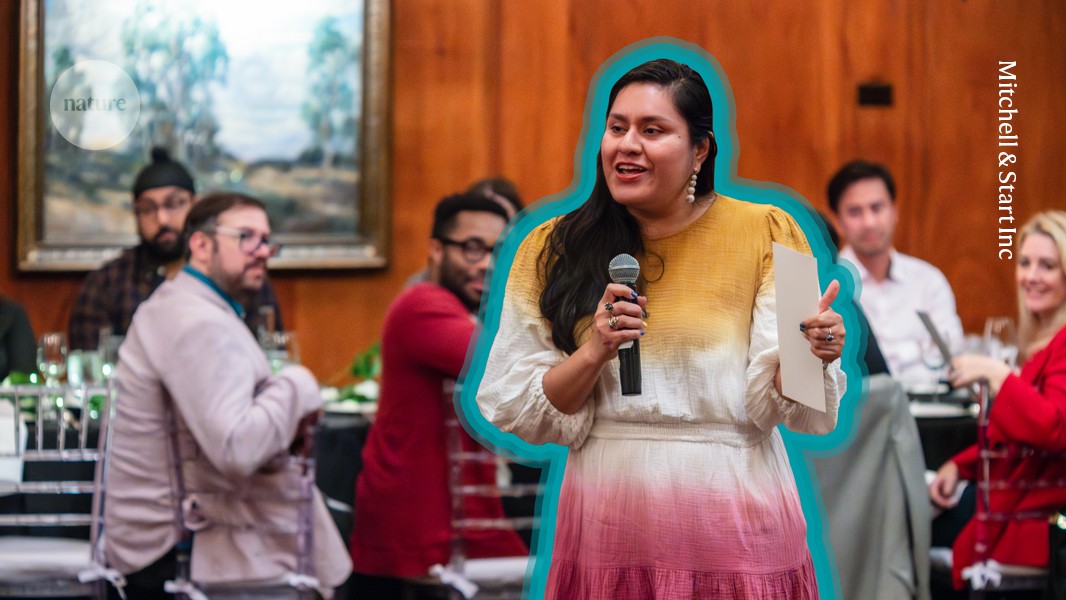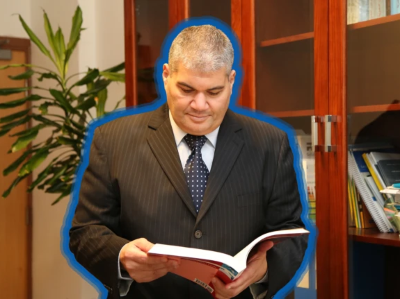In late 2023, Daisy Rosas Vargas made the gut-wrenching decision to leave what had initially seemed to be a dream job, after years of feeling unsupported as a Latina professor at a small undergraduate university. Rosas Vargas, an organometallic chemist, had always loved teaching, but she felt as if she was withering away, not reaching her full potential.
As a first-generation university student, she was always taught by her family to keep going, to be grateful to have a steady job and to push things such as mental health to one side. She broke that mould when she put her own health first and left academia.
Reflecting on what to do next, she thought about the things she truly enjoyed: teaching, outreach volunteering at a science museum and communication about science, technology, engineering and mathematics (STEM). So when a job opened up at Latinas in STEM, she took a chance. The non-profit organization, founded by Latina alumnae of the Massachusetts Institute of Technology in Cambridge, supports the development of Latina schoolchildren and undergraduate students in under-served communities. Now, she leads fundraising for the organization, writes profiles of early-career Latina scientists and coordinates the organization’s efforts to support children affected by the January wildfires in Los Angeles, California.
How to address gender equity in science in Africa
Based in Pasadena, California, she also serves up dishes with a dose of chemistry on the side, in a YouTube public-engagement series called Chemists in the Kitchen, from the US National Academy of Sciences. Most recently, she helped to develop an accessible course, Real Chem, that connects community college and university students to examples of chemistry in their own lives.
“Even though I’m not in academia any more, that doesn’t mean that the things I’ve learnt can’t be passed on,” she says. Rosas Vargas explains to Nature’s Careers team why she’s now helping to build the support structures for Latina girls and women in STEM that were so badly missing from her academic career.
Why is diversity, equity and inclusion (DEI) work important to you?
I grew up in the 1990s with the US educational television programme Bill Nye the Science Guy and cartoons that featured male scientists. I never really saw someone who looked like me. I didn’t meet my first Latina chemist until I was 27, which seems pretty late in life. I think that’s the reason I really care about public outreach, because a child shouldn’t wait that long to meet a role model who is from a similar background.
What single thing would you change about how science is done?
I wish there was absolutely mandatory, extensive DEI training for department chairs, provosts and anyone who is an early-career or senior researcher, because many people are not aware of their microaggressions. I’ve heard so many stories from other Latinas in STEM about comments made by professors or someone in authority, such as “you’re not good enough to be in this course” or “you’re not doing well, so just stop asking questions.” That’s just unacceptable.
I want people to be more pro-active and to put action behind their words. It’s not enough to do one online training session and then say you’re anti-racist.
What is the biggest misconception or stereotype about Latina people that you’d like to dispel?
People think Latinx people, or people with a Latin American background or heritage, aren’t good enough to be in STEM, especially if they went to a publicly funded school or university. If you went to public school, people might assume that your educational experience isn’t on par with private schools or well-funded public-school systems. When I was a professor, I received a negative comment that my teaching style was different and sub-par because I went to a public university for my undergraduate studies. That really stuck with me because it shouldn’t matter where I was taught chemistry, I made it here all the same. Luckily, I didn’t experience those kinds of comments during my undergraduate or graduate studies, like many other Latina people, because that would’ve changed my perspective on things.
‘I saw that discrimination wasn’t hearsay or rumours — it really did exist’
Another common stereotype is that Latinas talk too loud and we like to cause trouble. I’ve heard stories of this from other Latinas and even saw it in student evaluations of my teaching. But in reality, I’m shy and very quiet. Sometimes I think maybe I shouldn’t speak out about the discrimination I see or experience. I was raised to always listen to authority and respect my elders, so I used to remain quiet when things felt off.
But now, I’m not afraid to speak out about injustices or discrimination. That’s not ‘making trouble’ because I’m speaking out not only for myself, but also for the people coming after me. Now, in the United States, a lot of places are getting rid of DEI programmes and I think it’s time for us to actually be even louder. There’s a lot of work for us to do.
What is your best piece of advice to a 20-something researcher in your field?
I would tell younger chemists and people who aspire to be professors to look out for red flags. If something feels off at a workplace, don’t dismiss that. Ask for better and put yourself first if you’re not receiving what you deserve. People might say they want diversity, but are they willing to do the work to retain people from diverse backgrounds?




